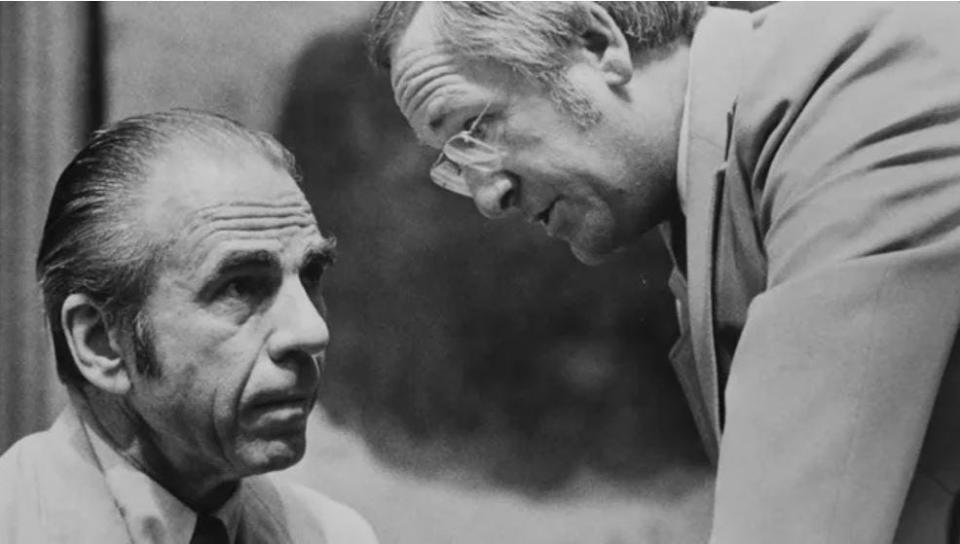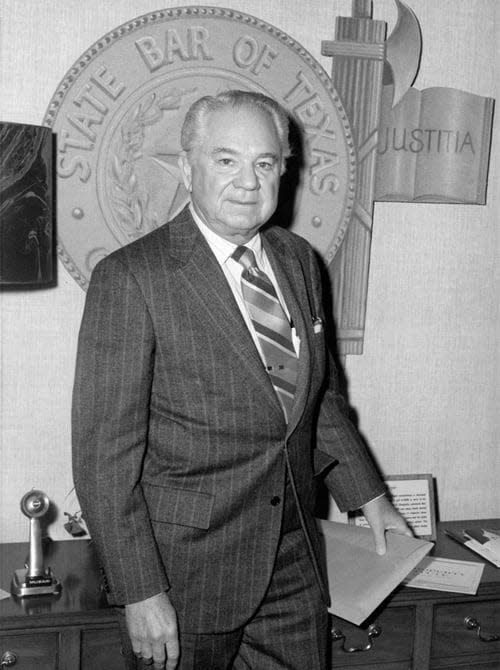Here's how the Ken Paxton impeachment has a connection to cocktails, Watergate and Jan. 6
- Oops!Something went wrong.Please try again later.
- Oops!Something went wrong.Please try again later.
- Oops!Something went wrong.Please try again later.
AUSTIN — Let's tug on a thread that weaves together the efforts to bounce from office two U.S. presidents, one elected judge and the current state attorney general, not to mention the sovereign right of Texans to enjoy a margarita at their favorite restaurant.
At the center of the fabric is a low-key but effective − now-deceased − state representative from Corpus Christi, and embedded in the tapestry is a late high-powered Texas lawyer who, as much as anyone, unraveled the Watergate scandal that spelled the demise of Richard Nixon's presidency.
Let's start with the state representative. He was a Democrat from Corpus Christi named DeWitt Hale who served 28 years in the Texas House. He wrote a law that did away with all-male juries and helped rewrite the state education code.
And during his second to last term in 1975, Hale was selected by then-Speaker Billy Clayton to chair the special committee that brought impeachment charges against one O.P. Carrillo, a corrupt South Texas judge whose transgressions included skimming public funds meant to help poor folks to buy himself groceries.

In making the case against the judge, Hale's committee compiled a 96-page report that reads like a how-to guide for any and all future impeachment efforts in Texas, including the one by the House in late May that set the stage for next month's Senate trial to determine if suspended Attorney General Ken Paxton will be removed from office.
The Hale committee's report from July 23, 1975, notes that Texas did not have statutory guidelines for the impeachment process, but it takes a deep-dive look dating back to English common law on how public officials have been removed from office over the centuries and adapted them to fit the times.
More: With flurry of motions, Ken Paxton asks Senate to toss out impeachment charges without trial
When Carrillo's case moved to the Senate, where the judge would be convicted and sent packing, the de-facto judge was then-Lt. Gov. Bill Hobby, the chamber's president. Hobby was not a lawyer, so he and the Senate tapped Houston lawyer Leon Jaworski to act as a counselor who could advise the body on the finer points of law as the trial unfolded.

By then, Jaworski was a national figure, having been named the Watergate special prosecutor and pretty exactly one year before in the summer of '74 was in the headlines every day as the Nixon coverup was exposed in a drip-by-drip process that ended with the 37th president's resignation on Aug. 9 of that year.
Jaworski died at 77 in December 1982.
That brings us to another effort to give another president his walking papers. And here, Paxton plays a headline-grabbing role. The Texas attorney general was among those who gave speeches in Washington supporting Donald Trump's efforts on Jan. 6, 2021, to essentially keep himself in office despite having lost his reelection bid two months earlier.
Paxton was not part of the insurrection at the Capitol later in the day, but he was part of the rally that preceded it. And he was among several Republican state attorneys general who went to court in a failed effort to invalidate election results in some states Biden had won.
Trump was impeached, but not removed from office, for the events of Jan. 6. Now he's facing criminal charges and insists they are baseless and politically motivated. Paxton says much the same about his own legal difficulties.
So how does the margarita part stitch itself into all of this? Admittedly, it's bit of a stretch. But there is a connection, not just to margaritas but to cocktails of any concoction.
When Hale died at age 100 in February 2018, his obituary in the Austin American-Statesman made no mention of his role as the architect of Carrillo's impeachment and removal. Instead, it led with the fact that Hale was the House sponsor of the 1971 legislation that allowed Texas restaurants to sell liquor by the drink.
No matter how Paxton's Senate trial turns out, it's a safe bet that when it's finally over many of the lawyers on both sides, many of the House managers who will lay out the charges, many of the senators who will sit as jurors, and many of reporters chronicling the testimony will take liberal advantage of DeWitt Hale's groundbreaking legislation from 52 years ago.
John C. Moritz covers Texas government and politics for the USA Today Network in Austin. Contact him at jmoritz@gannett.com and follow him on Twitter @JohnnieMo.
This article originally appeared on Corpus Christi Caller Times: Lawmaker who gave Texas liquor by the drink drew impeachment roadmap

